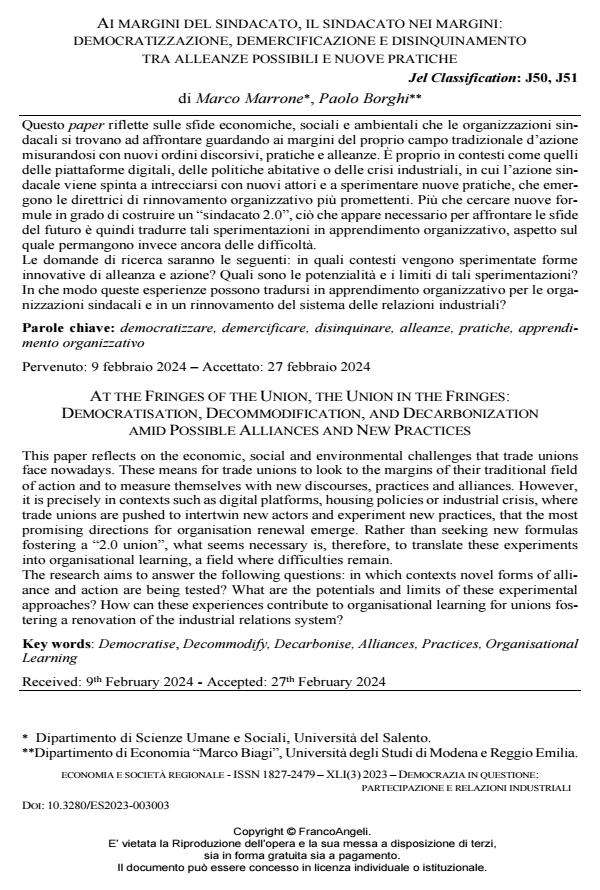Ai margini del sindacato, il sindacato nei margini: democratizzazione, demercificazione e disinquinamento tra alleanze possibili e nuove pratiche
Titolo Rivista ECONOMIA E SOCIETÀ REGIONALE
Autori/Curatori Marco Marrone, Paolo Borghi
Anno di pubblicazione 2024 Fascicolo 2023/3
Lingua Italiano Numero pagine 18 P. 35-52 Dimensione file 333 KB
DOI 10.3280/ES2023-003003
Il DOI è il codice a barre della proprietà intellettuale: per saperne di più
clicca qui
Qui sotto puoi vedere in anteprima la prima pagina di questo articolo.
Se questo articolo ti interessa, lo puoi acquistare (e scaricare in formato pdf) seguendo le facili indicazioni per acquistare il download credit. Acquista Download Credits per scaricare questo Articolo in formato PDF

FrancoAngeli è membro della Publishers International Linking Association, Inc (PILA), associazione indipendente e non profit per facilitare (attraverso i servizi tecnologici implementati da CrossRef.org) l’accesso degli studiosi ai contenuti digitali nelle pubblicazioni professionali e scientifiche.
Questo paper riflette sulle sfide economiche, sociali e ambientali che le organizzazioni sindacali si trovano ad affrontare guardando ai margini del proprio campo tradizionale d’azione misurandosi con nuovi ordini discorsivi, pratiche e alleanze. È proprio in contesti come quelli delle piattaforme digitali, delle politiche abitative o delle crisi industriali, in cui l’azione sindacale viene spinta a intrecciarsi con nuovi attori e a sperimentare nuove pratiche, che emergono le direttrici di rinnovamento organizzativo più promettenti. Più che cercare nuove formule in grado di costruire un “sindacato 2.0”, ciò che appare necessario per affrontare le sfide del futuro è quindi tradurre tali sperimentazioni in apprendimento organizzativo, aspetto sul quale permangono invece ancora delle difficoltà. Le domande di ricerca saranno le seguenti: in quali contesti vengono sperimentate forme innovative di alleanza e azione? Quali sono le potenzialità e i limiti di tali sperimentazioni? In che modo queste esperienze possono tradursi in apprendimento organizzativo per le organizzazioni sindacali e in un rinnovamento del sistema delle relazioni industriali?
Parole chiave:democratizzare, demercificare, disinquinare, alleanze, pratiche, apprendimento organizzativo
Jel codes:J50, J51
- Sindacato e politiche industriali in transizione. Il caso di industria italiana autobus Charlotte Bez, Angelo Castellani, Emanuela La Rocca, Gianluca Sala, in ECONOMIA E SOCIETÀ REGIONALE 2/2024 pp.41
DOI: 10.3280/ES2024-002004
Marco Marrone, Paolo Borghi, Ai margini del sindacato, il sindacato nei margini: democratizzazione, demercificazione e disinquinamento tra alleanze possibili e nuove pratiche in "ECONOMIA E SOCIETÀ REGIONALE " 3/2023, pp 35-52, DOI: 10.3280/ES2023-003003